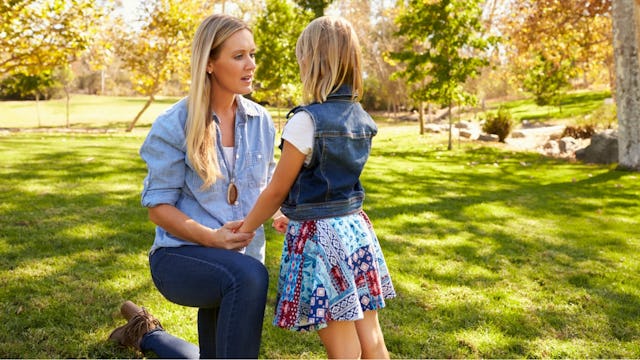Instead Of Yelling At Your Kids, Try Asking How You Can Help Them

Raising kids can be a frustrating experience. Even with all of the sweet giggles and soft skin and joys of witnessing childhood wonder, guiding a human being through the various stages of childhood can be rough. I’ve been at this gig for seventeen years, so I feel I can say with some certainty that parenting is a maddening endeavor.
The problem is, our kids are not to blame for parenting being maddening; it’s just the nature of the beast. Regardless, it’s far too easy to let our frustration with raising kids affect the kids we’re raising. I can’t count how many times I’ve let exasperation color my interactions with my children, especially when they’re struggling with a particularly annoying habit or behavior.
It doesn’t have to be that way, though. I’ve learned through the years to view a kid who is struggling with a habit or behavior as actually struggling. Even if it seems like they’re doing something on purpose. Even if they keep doing it no matter how many times they’ve been asked to stop.
Barring any actual clinical behavior disorders, most kids want to please their parents and do the right thing. Most kids are trying—they just aren’t always able to square their immediate impulses with their more overarching desire to make their parents proud of them.
Sometimes that looks like a kid neglecting to complete a chore she’s repeatedly been asked to do. Sometimes that looks like a child lollygagging instead of picking up their toys. Sometimes it looks like a kid unable to keep his hands or feet to himself.
It’s tempting to raise our voices and yell at a kid when they’re misbehaving. But there’s a more effective way that saves both your voice and your relationship.
The first step is to remember that misbehavior is a sign of a child struggling. The second step is to get on your child’s level and say these two sentences:
“I can see that you want to do your personal best right now. How can I help with that?”
Those two sentences—or something along those lines—can make all the difference, because you are asking them to be their best self without humiliating or shaming them. You’re reminding them that they are essentially good, that they want to do their best, and that you are there to help them do that.
And that’s really is our job as parents, isn’t it? To help bring out the best in our children? To help them develop the drive and the tools to live up to their potential? No one is motivated by having their struggles pointed out and ridiculed. No one is truly motivated to do their best by getting yelled at or smacked or humiliated. Some kids might behave because they don’t want to experience mom or dad’s wrath, but that’s not true internal motivation. It’s motivation based on fear.
One of the hallmarks of authoritarianism is equating respect with fear. People under authoritarian rule stay in line because they are afraid of what will happen if they don’t. But authoritarian parenting has been proven to be ineffective and potentially harmful. In addition, obedience out of fear is not true respect. And I want my children to practice obedience and develop self-discipline because it’s the right thing to do, because they trust my wisdom and experience to guide them, and because they feel an internal drive to do their best — not because they are afraid of me. And chances are that’s what you want too.
If I don’t treat my child as if he or she is trying to do the right thing, and if I don’t convey the message that I am here to help them succeed, what am I really teaching them? That they are broken in some way? That they need to be fixed, that their challenges are some innate flaw in their character?
All of us are on a journey of striving to be the best version of ourselves we can be. Our children are no different; they’re just still developing the basic skills and attributes to be able to take that task on for themselves. When we keep that in the forefront of our minds, and try to make our communication with them reflect that idea, they’ll get the message that we believe in their ability to change their behavior and we are happy to help them do that.
It’s not easy, of course. We are imperfect human beings raising other imperfect human beings, and all of us are prone to frustration. But we’re also the adults in the room. If we can’t control our responses to the stimuli our kids throw at us, how are we to expect them to control their responses to the stimuli life and learning throw at them?
Kids are learning. They struggle, often. They need our help to do their best. And they need us to believe that they are trying and that they are capable.
Parenting is hard. So is being a kid. When we model self-control, faith, and encouragement, we and our kids work toward being our personal best.
Hear what our real-life Scary Mommies, Keri and Ashley, have to say about this when they give their (always real) thoughts in this episode of our Scary Mommy Speaks podcast.
This article was originally published on